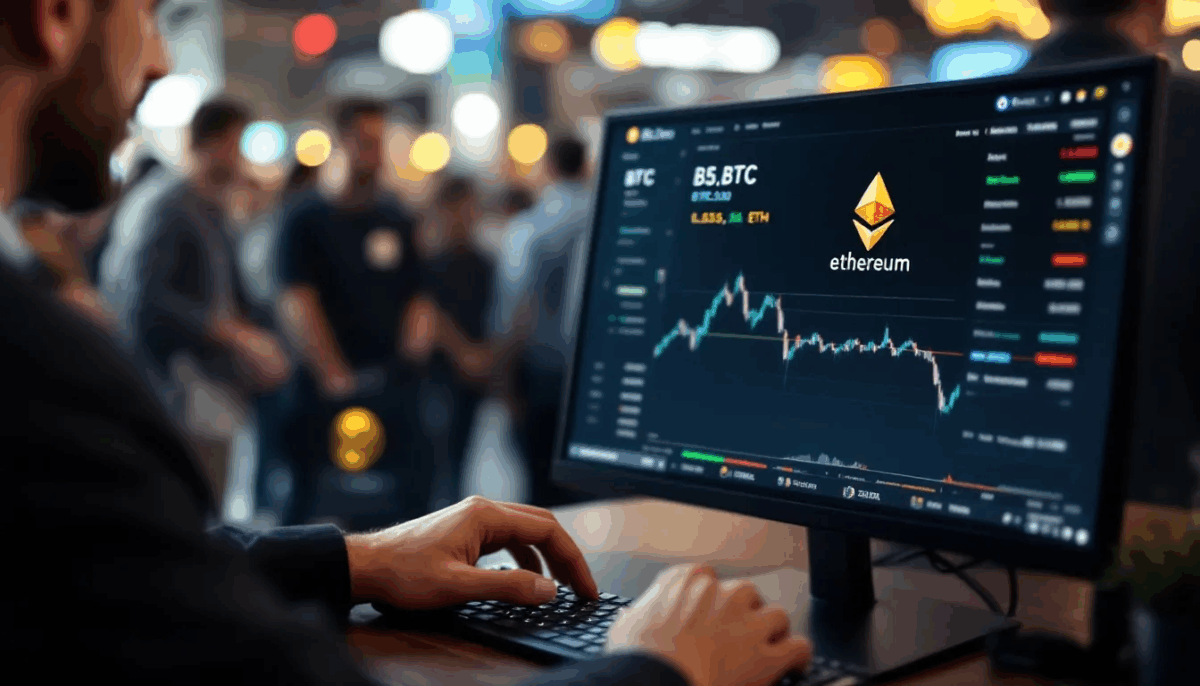Purchasing Bitcoin ($BTC) and Ethereum ($ETH), two of the most popular cryptocurrencies, remains the gateway into crypto for most investors. With so many platforms available, choosing the right exchange or wallet can feel overwhelming. Many exchanges allow transactions in USD, making it easier for users to buy and sell cryptocurrencies.
This guide breaks down the top platforms to buy BTC & ETH, comparing fees, features, and usability — with a special spotlight on BestWallet, a rising star in the DeFi and Web3 space.
Best Crypto Exchanges & Wallets for BTC & ETH (2025)
Platform | Best For | Fees | Payment Methods | KYC Requirements | Mobile App |
|---|---|---|---|---|---|
DeFi, Web3, multi-chain users | ~0.20% swap fee | Crypto (DEX aggregation) | No (non-custodial) | iOS & Android | |
Low fees, advanced trading | 0.10% spot fees | Bank Transfer, Card, P2P, Crypto | Yes | iOS & Android | |
Beginners, ease of use | 0.50% spread + fees | Bank Transfer, Card, PayPal | Yes | iOS & Android | |
Security & fiat gateways | 0.16% maker / 0.26% taker | Bank Transfer, Card | Yes | iOS & Android | |
Altcoin variety & low fees | 0.10% spot fees | Bank Transfer, Card, P2P | Optional | iOS & Android | |
Spot & derivatives trading | 0.10% spot fees | Crypto, Bank Transfer, Card | Partial (KYC limits) | iOS & Android |
The table below helps clients choose the best platform based on their needs, whether they are beginners or advanced traders.
BestWallet – A DeFi-First Platform for Buying BTC & ETH
BestWallet is not a centralized exchange, but a non-custodial hot wallet with built-in DEX aggregator. For crypto-native users who prefer to stay within the DeFi ecosystem, BestWallet provides seamless access to swap BTC, ETH, and thousands of tokens across multiple chains. BestWallet’s security features allow users to trade with confidence.
BestWallet’s innovative features and user trust have established its credibility in the industry.
Why BestWallet Stands Out:
- No KYC needed: Users retain full control of their assets.
- DEX Aggregator: Finds the best rates across Uniswap, PancakeSwap, and other DEXes.
- Multi-chain support: Ethereum, BNB Chain, Polygon, Arbitrum, etc.
- Web3 Features: NFT support, staking, IDO access.
- Mobile-first: Intuitive mobile app for easy BTC & ETH purchases.
- Advanced trading tools: BestWallet offers powerful trading tools to enhance the user experience.
- Market insights: BestWallet provides insights into various markets, helping users make informed trading decisions.
Pros:
- Full ownership of crypto assets.
- Supports DeFi swaps without intermediaries.
- Simple interface for wallet-to-wallet transactions.
- Users can easily fund their accounts through crypto transfers.
- BestWallet provides resources for investing in cryptocurrencies, helping users make informed decisions.
Cons:
- No direct fiat on-ramp (requires crypto for initial funding).
- Depends on third-party services for bank/card purchases.
- Lack of direct fiat deposit options can be a drawback for some users.
- Transaction fees can vary depending on network congestion and liquidity.
Ideal For:
- Users who already own crypto & prefer DeFi.
- Privacy-conscious users avoiding centralized KYC.
- NFT & multi-chain enthusiasts.
- Users who prefer using debit cards for transactions might need to use third-party services.
- Users should be aware of the risks associated with DeFi and crypto trading.
Binance – Best for Low Fees & Advanced Trading
Binance remains the global leader for crypto trading with over 5,000 pairs and the lowest fees in the industry. Binance’s fee structure is based on the user’s 30-day trading volume, with higher volumes leading to lower fees. Its 0.10% spot fee, advanced charting tools, and deep liquidity make it ideal for active traders. Taker fees on Binance are competitive and vary based on the user’s trading volume and order types.
Pros:
- Lowest trading fees.
- Advanced tools: Futures, staking, P2P trading.
- Supports multiple fiat currencies.
Cons:
- Complex interface for beginners.
- Full KYC mandatory for higher limits.
Coinbase – Best for Beginners
Coinbase simplifies crypto buying with a clean UI and strong regulatory compliance. Coinbase supports debit cards as a convenient payment method for buying cryptocurrencies. Perfect for newcomers who want a seamless BTC & ETH purchase experience via card or PayPal. ACH transfers are also available for US customers, offering a convenient and fee-free method for deposits and withdrawals.
Pros:
- Extremely user-friendly.
- High liquidity and trusted brand.
- Insurance on custodial assets.
Cons:
- Higher fees (spread + commission).
- Limited advanced trading features.
Kraken – Best for Security & Fiat Options
Kraken stands out for its robust security measures, including proof-of-reserves audits and multi-layered protection. Kraken allows users to fund their accounts through various fiat gateways, making it easy to start trading. It’s great for users wanting direct bank deposits to buy BTC & ETH. Advanced traders can execute complex strategies using Kraken’s sophisticated trading tools.
Pros:
- Strong security track record.
- Supports global fiat gateways.
- Advanced trading for pros.
Cons:
- Slower onboarding (strict KYC).
- Interface less polished for mobile.
KuCoin – Best for Altcoins & Optional KYC
KuCoin offers a massive range of altcoins but is also a great platform for BTC & ETH. KuCoin offers a massive selection of coins, including many altcoins not available on other platforms. With optional KYC (lower limits for unverified users), it’s appealing to privacy-conscious traders. The platform supports various order types, providing flexibility for different trading strategies.
Pros:
- Low trading fees.
- Massive coin selection.
- Passive income features: staking, lending.
Cons:
- Limited fiat integration.
- Past security breaches (now resolved).
Bybit – Best for Spot & Derivatives Trading
Bybit is known for its derivatives platform, but it also supports spot trading of BTC & ETH with low fees. Bybit supports advanced order types, such as Market, Limit, and Stop Limit orders, to enhance trading efficiency. Suitable for users interested in leveraged products and a clean mobile interface. Bybit’s fee structure is based on the user’s 30-day trading volume, with higher volumes leading to lower fees.
Pros:
- Leverage & spot trading in one platform.
- Competitive fees.
- Smooth mobile experience.
Cons:
- Partial KYC limits.
- Focused more on pro traders.
Feature Comparison: Best Platforms for BTC & ETH (2025)
Feature | BestWallet | Binance | Coinbase | Kraken | KuCoin | Bybit |
|---|---|---|---|---|---|---|
Trading Fees | ~0.20% swap | 0.10% | 0.50% spread | 0.16%/0.26% | 0.10% | 0.10% |
Payment Methods | Crypto swap | Bank, Card | Bank, Card | Bank, Card | Bank, Card | Bank, Crypto |
Fiat Support | No | Yes | Yes | Yes | Limited | Limited |
DeFi / Web3 Integration | Yes | Limited | No | No | Some | No |
KYC Requirements | No | Mandatory | Mandatory | Mandatory | Optional | Partial |
Mobile App | Yes | Yes | Yes | Yes | Yes | Yes |
Staking & Rewards | Yes | Yes | Limited | Yes | Yes | Yes |
Free Services | No | Yes | Yes | Yes | Yes | Yes |
Account Security | Standard | 2FA, Insurance | 2FA, Insurance | 2FA, Insurance | 2FA, Insurance | 2FA, Insurance |
User Base | Thousands | Millions | Millions | Millions | Millions | Millions |
Cryptocurrency exchanges are online platforms that enable users to trade cryptocurrencies, such as Bitcoin and Ethereum, for other digital assets or traditional fiat currencies like the US dollar. These exchanges play a crucial role in the crypto market, providing a secure and reliable way for individuals and institutions to buy, sell, and trade crypto assets. With the rise of decentralized finance, cryptocurrency exchanges have become increasingly popular, offering a range of features and services to users. In this section, we will explore the world of cryptocurrency exchanges, including their history, types, and benefits.
Security Features
Security is a top priority for cryptocurrency exchanges, as they handle sensitive user data and large amounts of crypto assets. Reputable exchanges implement robust security measures, such as encryption, two-factor authentication, and cold storage, to protect user funds and personal information. Additionally, many exchanges hold security certifications, such as SOC 1 and SOC 2, and comply with regulatory requirements, like anti-money laundering (AML) and know-your-customer (KYC) laws. Some exchanges also offer insurance for user assets, providing an extra layer of protection. When choosing a cryptocurrency exchange, it’s essential to consider the security features and certifications they offer to ensure a safe and secure trading experience.
Types of Exchanges
There are several types of cryptocurrency exchanges, each with its own unique features and benefits. Centralized exchanges (CEXs) are the most common type, offering a user-friendly interface and a wide range of trading pairs. Decentralized exchanges (DEXs) operate on blockchain technology, providing a more secure and transparent trading experience. Hybrid exchanges combine the benefits of CEXs and DEXs, offering a balance between security and usability. Additionally, there are derivative exchanges, which allow users to trade cryptocurrency derivatives, such as futures and options. Understanding the different types of exchanges can help users choose the best platform for their crypto trading needs.
User Interface and Experience
A user-friendly interface is essential for a cryptocurrency exchange, as it enables users to navigate the platform easily and execute trades efficiently. A well-designed interface should include features such as real-time market data, charting tools, and advanced order types, like limit orders and stop-loss orders. Additionally, a good user experience should include a responsive customer support team, available to assist users with any questions or issues they may encounter. Some exchanges also offer mobile apps, allowing users to trade on-the-go. When evaluating a cryptocurrency exchange, it’s crucial to consider the user interface and experience, as it can significantly impact the overall trading experience.
Customer Support
Customer support is a critical aspect of a cryptocurrency exchange, as users may encounter issues or have questions about the platform. A reputable exchange should offer a responsive and knowledgeable support team, available through various channels, such as email, phone, and live chat. Some exchanges also provide a comprehensive FAQ section and educational resources, helping users to better understand the platform and the crypto market. Additionally, some exchanges offer additional benefits, such as account management and portfolio tracking, to help users manage their crypto assets more effectively. When choosing a cryptocurrency exchange, it’s essential to evaluate the customer support options and ensure that they meet your needs.
Why BTC & ETH Are Still King in 2025
- Bitcoin is the ultimate digital store of value.
- Ethereum is the powerhouse behind DeFi, NFTs, and smart contracts.
- Most accepted cryptocurrencies across exchanges, wallets, and online casinos.
- Foundational assets for staking, borrowing, and trading.
- In-house research teams have consistently ranked BTC and ETH as top cryptocurrencies.
- BTC and ETH operate independently of any government, emphasizing their decentralized nature.
- The historical price growth of BTC and ETH makes them attractive investment options.
FAQs
Which is the best exchange to buy BTC & ETH in 2025?
- Beginners: Coinbase. Each exchange requires users to set up an account to start trading.
- Low fees & trading features: Binance. Users must register and verify their identity to access the full range of services offered by these exchanges.
- DeFi users: Best Wallet.
- High-security seekers: Kraken.
Can I buy BTC & ETH without KYC?
Some exchanges like KuCoin and WSM Exchange (DeFi model) allow limited trading without KYC. Setting up an account on these exchanges typically requires identity verification. However, most platforms require identity verification for higher limits. Registering on a platform is necessary to comply with regulatory requirements and to ensure the security of your account.
Which exchange is best for mobile users?
Coinbase for simplicity. Bybit & Binance for advanced trading on mobile.
Is it cheaper to buy BTC & ETH with bank transfer or card?
Bank transfers usually have lower fees compared to card purchases. However, cards offer instant settlement, which is why they are popular despite slightly higher fees.
Are crypto exchanges safe in 2025?
Leading exchanges like Binance, Kraken, Coinbase, and Bybit implement advanced security measures. Always enable 2FA, use hardware wallets, and avoid leaving funds on exchanges for long-term storage.
Can I buy BTC & ETH directly in BestWallet?
BestWallet uses DEX aggregators to facilitate crypto swaps. You’ll need existing crypto (like USDT, USDC) to swap into BTC or ETH. For fiat purchases, external services are required. BestWallet offers advanced features like staking and IDO access, catering to both beginners and experienced traders. Additionally, BestWallet’s security measures provide peace of mind for users, ensuring that their funds are protected and readily accessible.
Is BestWallet safe for holding BTC & ETH?
Yes. As a non-custodial wallet, BestWallet gives users full control over their private keys. Security depends on the user’s device and practices (e.g., seed phrase protection). BestWallet is a reputable company with a strong focus on user security. Additionally, BestWallet allows users to connect through various APIs for enhanced functionality.
Which exchange is cheapest for BTC & ETH?
Binance remains the cheapest for spot trading with just 0.10% fees. As a global exchange with a large user base, Binance offers competitive rates. However, DEX swap fees on BestWallet are competitive depending on liquidity and gas costs. Additionally, trading volume can impact the fees on different platforms, making it cost-effective for higher-volume traders.
Should beginners use BestWallet to buy BTC & ETH?
Beginners might find Coinbase easier due to its fiat on-ramps and user-friendly interface. BestWallet is better suited for users who are comfortable with DeFi tools and crypto wallets. However, it’s important to note the risks associated with using DeFi tools for beginners, as they can be complex and carry significant risks. Additionally, taker fees can vary depending on the platform, which is essential to consider when assessing the overall cost of trading. For US customers, ACH transfers are available for easy deposits and withdrawals, making it convenient to manage funds.







![Top VIP Crypto Casinos with High Roller Perks [2025]](https://coinnews.com/wp-content/uploads/2025/05/cbf67059-de4a-485a-b7cc-603b861d1eef-e1748341865818.png)
